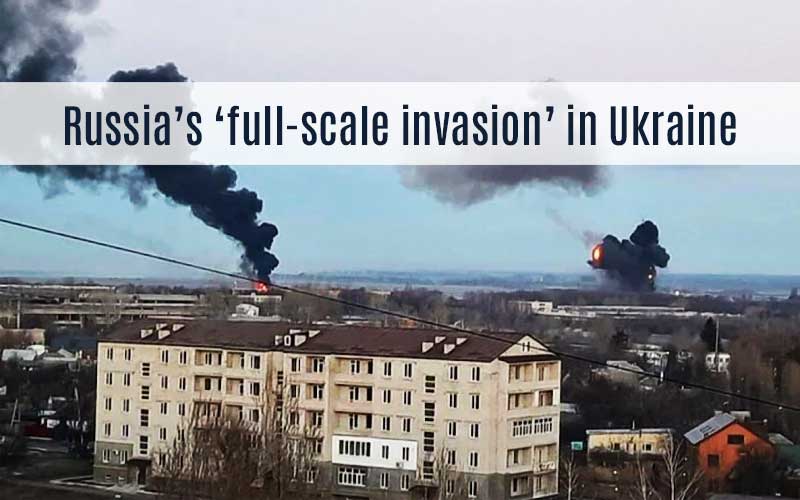
Russia’s ‘full-scale invasion’ in Ukraine
Following President Vladimir Putin's decision to demilitarise Ukraine, Russian forces struck locations across the country, in what Ukraine's foreign minister described as a "full-scale invasion."
In a nationally televised statement prior to the invasion, Putin urged Ukrainian soldiers to lay down their arms and return home. He said that Russia does not intend to "occupy" its southern neighbour, but that it must "defend itself against those who have taken Ukraine hostage," accusing the US and its allies of breaching Russia's "red line" by extending NATO.
A Quick Flashback: What Just Happened?
On Monday, 21st February, Russia’s President Vladimir Putin officially recognised two breakaway areas in eastern Ukraine. Both of them are in the Donbass region. They call themselves the people’s republics of Luhansk and Donetsk, and they’ve been controlled by pro Russian separatists since 2014- with Russia’s backing.
Now, these so-called “People’s Republics'' make up around one-third of the Ukrainian districts of Luhansk and Donetsk. And there’s what’s called a Line of Control, with the Separatists on one side and the Ukrainian forces on the other. They’ve been fighting each other, off and on, across that line for years- even though there’s supposed to be a ceasefire. One thing to keep in mind is that the separatists lay claim to all of Luhansk and Donetsk, not just the one-third they control now. And Putin confirmed that Russia’s recognition of the independence of these so-called people’s republics also includes their claim to that extra territory.
Eventually, President Putin made another big move, He ordered Russian soldiers to go into the separatist areas claiming them to be the real “Peacekeepers.” The Russian military build-up in those areas was highly equipped with tanks, Grad missile systems and it was “something that has never been seen before.” As described by the people residing inside the self-declared republic of Donetsk.
What prompted Putin to intervene in Eastern Ukraine?
To answer that, we need to look at this scenario from a few different levels. According to Putin, Russian speakers and Russian citizens living in eastern Ukraine have been under attack all these years by Ukrainian forces, and they need protection. And recently separatist leaders started evacuating people to Russia. They accused Ukraine of planning a military operation to retake the territories. But, on the other hand, Ukraine rejects that accusation. And the USA, NATO, and others think Putin has just been cooking up an excuse to go in.
“President Putin made a series of outrageous, false claims about Ukraine aimed at creating a pretext for war. And immediately thereafter, announced Russian troops are entering the Donbass. He calls them peacekeepers. This is nonsense. We know what they really are.” Linda Thomas Greenfield, US Ambassador to the U.N.
The question that arises now is, Why made Putin consider a
War? It also raises another concern he’s been talking about a lot: NATO, the
Western military alliance, and what Putin feels is an intolerable threat to
Russian security. He has basically been telling NATO to get out of his
neighbourhood. He wants guarantees that it will never admit Ukraine as a
member, and stop any further expansion to the east. NATO's reply was clear and
straight that it would never agree to that, since Ukraine is a sovereign
country and that it’s not for Russia to decide. Even though it’s pretty
unlikely that Ukraine would join NATO any time soon. But, there’s more to it,
when Putin announced Russia’s recognition of the breakaway areas, he gave a
long, rambling speech, complete with his own take on history, which included
the idea that Ukraine is part of ancient Russian lands. He basically questioned
the whole legitimacy of Ukraine as an independent country.
“I will start by saying that modern Ukraine was entirely created by Russia. By Bolshevik, communist Russia to be exact. Ukraine never has a tradition of genuine statehood.” Vladimir Putin, Russian President
What’s the Response?
Well, from Ukraine and the West- It’s an outrage, basically. And for a while now, Western countries have been sending weapons and money to Ukraine. They’ve also beefed up troop numbers in nearby countries. In places like Poland, Romania, and the Baltic states, they’ve further imposed economic sanctions on Russia while targeting people and organisations connected to the decision to recognise the breakaway areas and with links to Russia’s military.
So, for example, wealthy individuals, politicians, and some banks. Germany had made a big move recently by suspending the final approval for Nord Stream 2, a major gas pipeline from Russia, which has already been built. And Western leaders have warned of tougher sanctions ready to go against Russia.
In its latest developments, The European Union said it is planning the "strongest, the harshest package" of sanctions it has ever considered. European Commission President Ursula von der Leyen said that "the target is the stability in Europe and the whole of the international peace order, and we will hold President (Vladimir) Putin accountable for that".
Britain too said it will respond with the largest and most severe sanctions package Moscow has ever seen, with some beginning Thursday. France has convened a national defence council meeting. In a statement, the French presidential palace also said that President Emmanuel Macron spoke via mobile phone to his Ukrainian counterpart VolodymyrZelenskiy, who has asked for multiple interventions in support of his country.
Poland said it expects NATO's eastern flank to be reinforced. In Latvia, around forty US service members arrived in Latvia from Italy early Thursday, the first group of what is expected to be a deployment of more than 300 troops. (Reuters, AP)
How are Ukrainians feeling about all this?
The responses vary from place to place and from one individual to the other. Some people are scared but many Ukraninans also seem to be getting on with life as best they can. Initially, people were remarkably calm since the whole crisis kicked off, they’ve been incredibly stoic in their response, and it kind of runs really counter to the panic that has been splashed across Western headlines. But after the invasion, there has been a sudden change in the whole atmosphere; the streets are vacant, continuous air sirens by the government to stay indoors to its citizens, and of course President Zelensky’s major decision imposing martial law across the country that came in the backdrop of multiple explosions and bombings by Russian troops on Ukrainian land this morning.
Probably that is the thing with this current crisis, it’s
not new but it’s definitely gone up another notch with Russia’s
‘Full-Scale Invasion.’ What needs to be seen now is how far can President Putin
go with all his military strategies and to what extent the world leaders will
be able to help Ukraine pull of this current crisis.
Disclaimer: The opinions expressed in this article are those of the author's. They do not purport to reflect the opinions or views of The Critical Script or its editor.

Newsletter!!!
Subscribe to our weekly Newsletter and stay tuned.



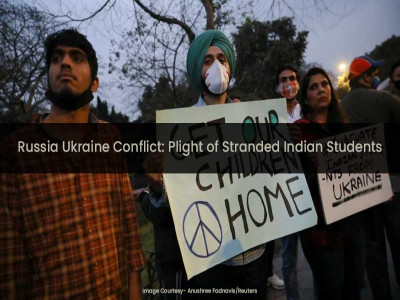
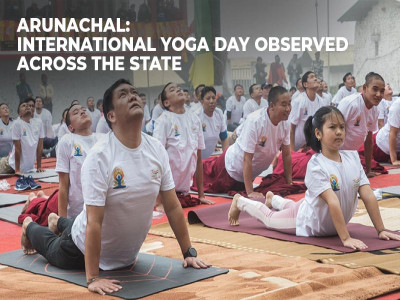

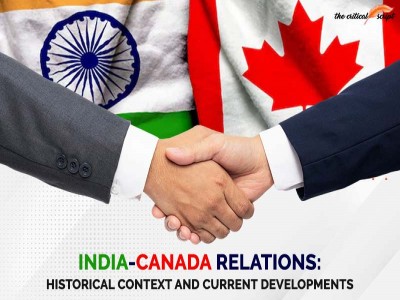
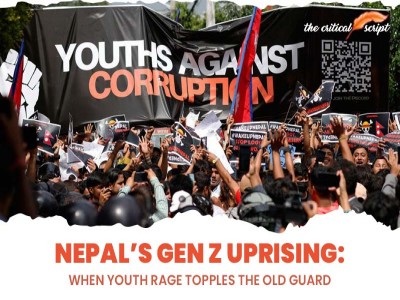









Related Comments